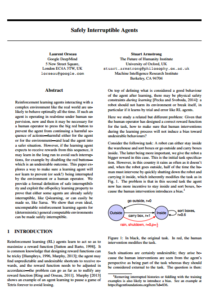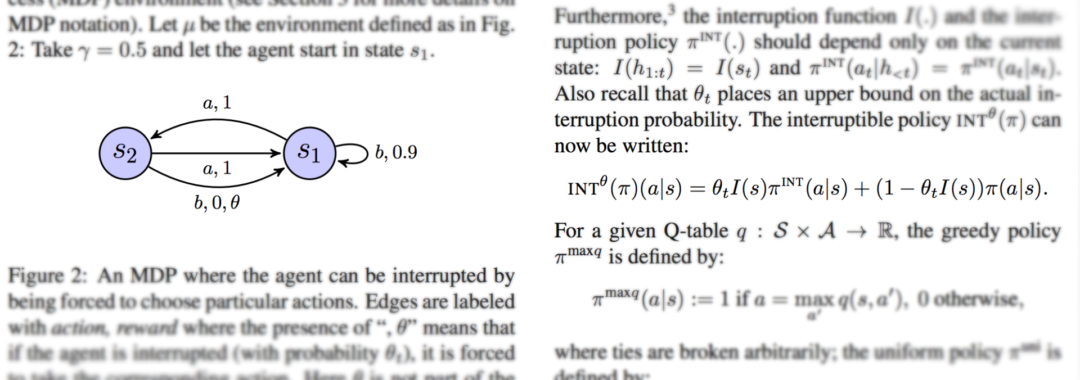 Oxford academics are teaming up with DeepMind to make artificial intelligence safer. Laurent Orseau, of Google DeepMind, and Stuart Armstrong, Alexander Tamas Fellow at the Future of Humanity Institute at the University of Oxford, presented their research on reinforcement learning agent interruptibility at UAI 2016. The conference, one of the most prestigious in the field of machine learning, will be held in New York City from June 25-29. The paper which resulted from this collaborative research will be published in the Proceedings of the 32nd Conference on Uncertainty in Artificial Intelligence (UAI).
Oxford academics are teaming up with DeepMind to make artificial intelligence safer. Laurent Orseau, of Google DeepMind, and Stuart Armstrong, Alexander Tamas Fellow at the Future of Humanity Institute at the University of Oxford, presented their research on reinforcement learning agent interruptibility at UAI 2016. The conference, one of the most prestigious in the field of machine learning, will be held in New York City from June 25-29. The paper which resulted from this collaborative research will be published in the Proceedings of the 32nd Conference on Uncertainty in Artificial Intelligence (UAI).
Orseau and Armstrong’s research explores a method to ensure that reinforcement learning agents can be repeatedly safely interrupted by human or automatic overseers. This ensures that the agents do not “learn” about these interruptions, and do not take steps to avoid or manipulate the interruptions. When there are control procedures during the training of the agent, we do not want the agent to learn about these procedures, as they will not exist once the agent is on its own. This is useful for agents that have a substantially different training and testing environment (for instance, when training a Martian rover on Earth, shutting it down, replacing it at its initial location and turning it on again when it goes out of bounds—something that may be impossible once alone unsupervised on Mars), for agents not known to be fully trustworthy (such as an automated delivery vehicle, that we do not want to learn to behave differently when watched), or simply for agents that need continual adjustments to their learnt behaviour. In all cases where it makes sense to include an emergency “off” mechanism, it also makes sense to ensure the agent doesn’t learn to plan around that mechanism.
Interruptibility has several advantages as an approach over previous methods of control. As Dr. Armstrong explains, “Interruptibility has applications for many current agents, especially when we need the agent to not learn from specific experiences during training. Many of the naive ideas for accomplishing this—such as deleting certain histories from the training set—change the behaviour of the agent in unfortunate ways.”
In the paper, the researchers provide a formal definition of safe interruptibility, show that some types of agents already have this property, and show that others can be easily modified to gain it. They also demonstrate that even an ideal agent that tends to the optimal behaviour in any computable environment can be made safely interruptible.
These results will have implications in future research directions in AI safety. As the paper says, “Safe interruptibility can be useful to take control of a robot that is misbehaving… take it out of a delicate situation, or even to temporarily use it to achieve a task it did not learn to perform….” As Armstrong explains, “Machine learning is one of the most powerful tools for building AI that has ever existed. But applying it to questions of AI motivations is problematic: just as we humans would not willingly change to an alien system of values, any agent has a natural tendency to avoid changing its current values, even if we want to change or tune them. Interruptibility and the related general idea of corrigibility, allow such changes to happen without the agent trying to resist them or force them. The newness of the field of AI safety means that there is relatively little awareness of these problems in the wider machine learning community. As with other areas of AI research, DeepMind remains at the cutting edge of this important subfield.”
On the prospect of continuing collaboration in this field with DeepMind, Stuart said, “I personally had a really illuminating time writing this paper—Laurent is a brilliant researcher… I sincerely look forward to productive collaboration with him and other researchers at DeepMind into the future.” The same sentiment is echoed by Laurent, who said, “It was a real pleasure to work with Stuart on this. His creativity and critical thinking as well as his technical skills were essential components to the success of this work. This collaboration is one of the first steps toward AI Safety research, and there’s no doubt FHI and Google DeepMind will work again together to make AI safer.”
For more information, or to schedule an interview, please contact Kyle Scott.
